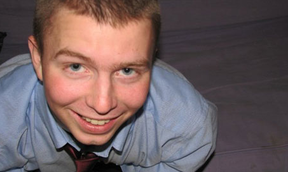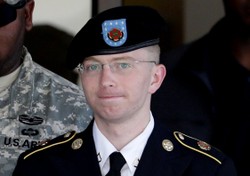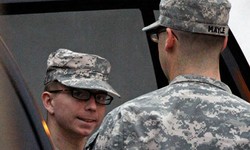 Lance Corporal Joshua Tankersley and Lance Corporal Jonathan Cline individually, via telephone link up, told their versions of an incident involving Bradley Manning.
Lance Corporal Joshua Tankersley and Lance Corporal Jonathan Cline individually, via telephone link up, told their versions of an incident involving Bradley Manning.
On January 18th 2011, the two men had escorted Manning to an exercise room. Both were later removed from active duty for what happened next.
For a while, it seemed that they simultaneously gave conflicting orders to the young private, who was standing to attention before them. An example given was one lance corporal yelling, "Turn left!", while the other shouted, "Don't turn left!"
During the course of the session, Private Bradley Manning either fainted or fell. Manning scrambled to his feet and raced behind a weights machine. He later claimed that it was because the guards were 'lunging' at him, as if to hurt him.
He apparently became very upset, crouched in the corner there and sobbing. This incident was used to further prolong the restrictive POI status, under which Manning was held.
Tankersley and Cline both testified that Manning was acting agitated from the moment he was collected from his cell. Cline explained the procedure. First Manning's wrists would be handcuffed, then he had to turn around, while they fitted a restraining belt. Finally, Manning had to kneel, as leg restraints were added.
In this way Bradley Manning could leave the 6ft x 8ft cell, wherein he remained for all but an hour of his day. He had a choice between an hour of exercise, in the indoor fitness facility, or 20 minutes of sunshine and 40 minutes of exercise.
But on this occasion, Cline testified, Manning had to keep being 'corrected', as he was 'moving his hands when we put on his restraints.'
This was supported by Tankersley, who maintained that '(when) we put him in restraints, he did not respond in a correct manner.' Manning had to twice be told to stop moving, both in his cell and when the restraints were removed in the exercise room.
Cline stated that, "(Manning) fell down on his butt. We tried to catch him, he went hiding behind a weight machine and he began to cry."
Neither man could understand why they'd been stepped down on charges of intimidation. Cline added, "I spoke to him basically like to a normal human being. They're in the facility, that's their punishment. They don't need to be screamed at or yelled at."


 Lance Corporal Joshua Tankersley and Lance Corporal Jonathan Cline individually, via telephone link up, told their versions of an incident involving Bradley Manning.
Lance Corporal Joshua Tankersley and Lance Corporal Jonathan Cline individually, via telephone link up, told their versions of an incident involving Bradley Manning.
 Gunnery Sgt. Fuller defended the treatment of Bradley Manning at Quantico.
Gunnery Sgt. Fuller defended the treatment of Bradley Manning at Quantico. 


 The pre-trial hearing, at Fort Meade, had previously heard how Bradley Manning removed people from the list of those cleared to visit him at Quantico.
The pre-trial hearing, at Fort Meade, had previously heard how Bradley Manning removed people from the list of those cleared to visit him at Quantico.








 St Tydecho's Churches in West Waleson 09/03/2014
St Tydecho's Churches in West Waleson 09/03/2014
 Goodies for an Outlander Premiere Partyon 03/06/2015
Goodies for an Outlander Premiere Partyon 03/06/2015
 Holocaust Memorial Day Interview with Rainer Höss, Grandson of Rudolf Architect of Auschwitzon 01/24/2015
Holocaust Memorial Day Interview with Rainer Höss, Grandson of Rudolf Architect of Auschwitzon 01/24/2015
 Romantic Valentine Gifts for an Outlander Fanon 01/16/2015
Romantic Valentine Gifts for an Outlander Fanon 01/16/2015



Comments
And by which law. In international law, which the USA is party to, he's reported war crimes. That's covered too. Keeping quiet wouldn't have been a defense at Nuremburg.
Happy New Year, Hollie! <3
Guilty of what is the real question; Bringing to light some shocking information which is in the public interest to know, or keeping quiet about what really goes in on the military. He's definitely not guilty of the latter. Happy New Year, Jo :)
I had another conversation like this recently. The person I was talking to swore that Bradley Manning was definitely guilty. How did she know, when there hadn't been a trial? She'd read it in a newspaper...
So @Ed, because you think he's guilty he should be treated as if he is guilty whether or not he's actually been found guilty in judicial process. You know this is pre-trial right? Not even the actual trial?
EdFisher - Oh no! Did they hold the actual trial and I missed it? I thought that we were in recess on the pre-trial!
Thank you for reading it. I'm ridiculously behind on finishing the series. I have another six days to go! But I will get there. I think it's a very important issue to detail.
Just an outstanding series Jo. I, for one, really appreciate this series. I have never really forgotten about Manning. I was a soldier myself once. How any of them is treated, regardless of situation, is of interest to me.
He's accused of handing top secrets video footage and documents to Wikileaks. They exposed torture and war crimes committed by the USA in the Middle East, amongst other things.
The most famous of all is the Collateral Murder video, which shows an Apache helicopter shooting and killing civilians, including a journalist and photographer. Two children were wounded.
http://www.youtube.com/watch?gl=GB&hl...
What was he actually accused of doing? Maybe I missed it. I have tried to keep up.